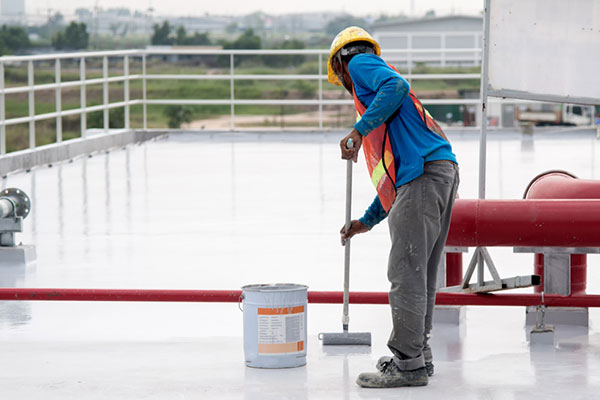How to Move into Commercial Roof Coating from Residential Roofing
Author: Dan Stout | August 17, 2023
It's not unusual for an experienced residential roofer to consider making the leap into commercial projects. After a long day of briefing homeowners, stocking shingles and navigating trailers through neighborhood streets, the grass might start to look greener on the commercial side of the street.

But commercial-scale jobs come with commercial-scale expenses, and these upfront costs can be a significant hurdle for residential roofing contractors. Luckily, commercial roof coating is a perfect bridge between residential and commercial work.
Here are some of the reasons roof coating is such a good stepping stone from residential work, the tools and training required and a general checklist of tips and tricks for making the switch.
Why Make the Jump to Commercial Roof Coatings?
The size of a commercial payday is certainly an attractive pull to the commercial roof coating business. Here are three more reasons to make the switch beyond simply dollar signs.
1. Greater Stability
If you're working on both residential and commercial projects, when one market slows, the other can pick up the slack.
2. Increased Options
Roof coatings are a good inroad to more lucrative commercial jobs. As your network of commercial customers grows, your options will expand. You may choose to springboard into commercial reroofs or new builds, or you may decide you'd rather stay tightly focused on coatings.
3. Repeat Customers
Commercial property owners often own multiple buildings and appreciate both the upfront savings of roof coating and the energy savings from a white roof. If you establish a solid relationship with a few commercial owners, you might find your crews are booked out for months at a time.
Tools for Commercial Roof Coating
The low cost of roof coating equipment makes it very accessible to established residential roofers, who likely already own most of the basic tools. As you get started, you'll want to have access to the following:
- Truck and ladders. If you're coming from residential roofing, you likely already have the truck and ladders you need.
- Cleaning supplies. You'll need scrapers and soaps to remove built-up dirt and grease (especially around commercial kitchens).
- Power washer. This makes prep cleaning much easier. As you tackle larger jobs, you can pick up a wheeled, multi-nozzle sprayer, but a standard model is good enough to get started.
- Rollers and brushes. Use the manufacturer's recommended nap size for the rollers. Buy these in bulk so you'll never get caught shorthanded.
- Airless sprayer. Some coatings can be applied with an airless sprayer, speeding application time.
- Coating materials. There are several types of coating to meet both the customer's needs and your own comfort level. Try starting out with water-based acrylic coatings because of their low upfront investment and easy cleanup.
Training for Commercial Roof Coating
Even if you've done some previous coating jobs, taking on some additional training is still a good idea. You'll likely end up using more than one type of coating, and installation varies among them, so knowing how to apply multiple types of coatings will be beneficial. Additionally, because of the size of commercial jobs, a mistake that's inconvenient to fix on a single-family home could be a devastating financial hit on a 10,000-square-foot warehouse.
So where can you turn for training? Go straight to the source.
Manufacturers are a gold mine for support and training. Each installation puts their reputation on the line, so it's in their best interest to work with well-trained installers.
Some manufacturers offer free training and resources, while others offer paid options. Head to the manufacturer's website to see if they have programs and resources specifically designed for residential roofers making the leap to commercial work. They also might have in-person tutorials and licensed applicator programs or product-specific guides.
Tips for New Commercial Roof Coating Companies
Ensure you're up to date on any required licensing or registration for commercial work. It's common for towns to have different requirements for commercial and residential roofers.
Make it easy for customers to understand that you specialize in roof coatings. File for a DBA ("doing business as") with "coating" in your company name. When customers refer you to friends or do an internet search for roof coating companies, you want to be top of mind.
When you're ready to line up work, start with your existing customers and vendors. Scroll through your contacts list to find customers who were happy with your work, then reach out and let them know what you're doing. A general contractor you worked with might have a commercial lead, or a homeowner may own a commercial property. Next, reach out to your local Beacon supplier. They may be able to send leads your way or share your info with potential customers.
Watch out for damaged or neglected roofs during estimates. Roof coatings can't fix bad roofs! The best-case scenario may be that you'll have to explain why the customer needs to spend significantly more than they expected — and the worst-case scenario could be that you do the job and the roof fails six months later.
Be ready to explain roof coatings to customers. Provide manufacturer's documentation, or send them to educational articles about the savings roof coatings provide.
If you're ready to take the leap into commercial roof coatings, gather your tools, get the proper training and keep these tips in mind.